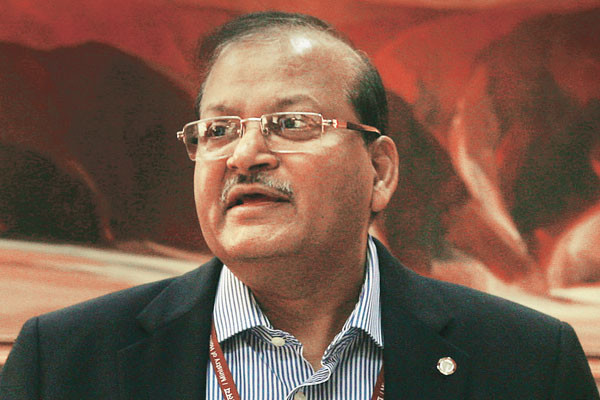
Stress in Indian banking will be short-lived: Naina Lal Kidwai
By Meghna Mittal New Delhi, (IANS) The stress in the Indian banking system is short-lived and this key industry will only emerge stronger, says veteran banker Naina Lal Kidwai.
With more than 35 years of banking experience behind her, Kidwai spoke to IANS here on a host of issues — from the stressed banking scenario in India, consolidation, fears over bad loans, the bad exposures to Kingfisher and HSBC India’s own strategy shift.
She said the decision by HSBC Bank’s India unit, which she chaired till last December, to close 24 branches was not linked to the overall stress factor. Excerpts from the interview:
Q. Was HSBC’s recent announcement to shut 24 retail branches in India an outcome of its stressed state?
A. It is a strategic move on the part of HSBC India. In fact globally, the trend in banking is to move away from multiple branches and to reach more people online, and invest in internet banking propositions. Cutting costs is only one of the factors. In the full scheme of things, it is not material. The strategy varies from bank to bank. We should not relate it to cutting costs or foreign banks feeling apprehensive, due to the stressed assets in the banking sector.
Foreign banks have always done well in India even with limited branches, as RBI (Reserve Bank of India) licenses for retail branches were hardly given. So foreign banks will in future too have limited retail branches in India, focusing on wholesale banking as they have traditionally done.
Q. But are foreign banks untouched by non-performing assets (NPAs) and bad loans in India?
A. Standard Chartered Bank has reported high NPAs. It is not that foreign banks are untouched by stressed assets — but the problem is far more manageable for them as most have not funded large projects in power and steel sectors, where a large part of the problem lies.
Q. Given the state of bad loans, should the bank chiefs be brought under a code of conduct for their lending decisions?
A. They should not be held responsible — loans can go bad any time because of various reasons. One person can’t be held responsible. If they are, then once a person becomes chief executive, loans will be held back fearing that five years down too he/she will be held reaponsible for a bad loan.
But, before giving out any loan, banks should evaluate the sector and the risks involved. The decision is taken by an entire team in a bank. The system needs to be robust with checks and evaluations. But if there is malfeasance or corruption, it must be duly dealt with. In certain cases like Kingfisher Airlines, the banks should have evaluated the sector. When did a company last make money in the airline business?
Q. How will consolidation of banks help?
A. It will not help in reducing bad loans. But yes, that’s the way forward. Then, only the strong banks will remain. Weaker ones will be merged into strong banks and it can, therefore, help with capitalisation of banks and bring down overhead costs.
Q. Do you think the bankruptcy law will be enough to check NPAs?
A: We need mechanisms on bad loans to be put into place. The new bankruptcy law is a huge step in the right direction. Implementation of the tribunals envisaged by this law will take time. It is critical that we implement this bill with urgency.
Banks also need to be more cautious as over exposure to sectors that depend on commodities or regulatory interface, was responsible for NPAs in this last downturn. It was bad luck as well that the global downturn and China slowing coincided with our domestic problems in power and commodities. But now the situation is improving.
When the Bankruptcy Bill comes into effect, it will be very helpful for the banks. We are also seeing many specialist organisations, ARCs (asset reconstruction companies) etc. who will help to work out the bad loans.
Q. By March 2017, banks have to fully disclose their NPAs. What scenario do you see emerging?
A. It’s difficult to say as to by when banks will be able to fully erase their NPAs. But yes, NPAs will be at their highest in March 2017, and post that, the NPAs will start tapering in every quarter.
Q. While still at HSBC, could you sense the NPA scenario getting worse?
A. The issue was emerging 3-5 years ago and it is only now that banks are fully providing for bad loans. But the banks will come out it. It is good that the transparency of our banks has improved and this is reflected in share prices of our public sector banks. It is beginning to move up as investors believe there are no hidden surprises. Also the finance ministry and RBI are looking to improve the governance standards of these banks.
Q. What’s keeping you busy post-HSBC?
A. I retired from HSBC India on December 31, 2015 after a 13-year stint with the bank. But I do not miss banking and divide my time between various things. I am non-executive chairman of Max Financial Services and also an independent director on the boards of Cipla, Larsen and Toubro, Altico Capital and Nestle global.
I also spend half my time in areas to do with water and the environment and women empowerment. I founded and chair ‘The India Sanitation Coalition’ — a platform where all players in sanitation convene to learn, share and collaborate with a view to enhance the overall impact and support the government’s Swaach Bharat Mission. The objective is to ensure the entire cycle in sanitation is covered — build, use, maintain and treat.
(Meghna Mittal can be reached at meghna.m@ians.in)

